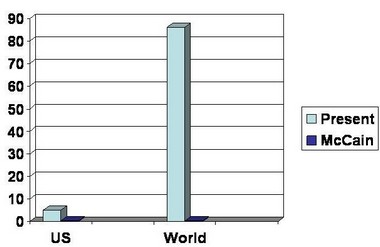With the aid of Congressional Democrats, the Bush administration has received funding for covert action within Iran, with the aim of gathering intelligence on its nuclear program and destabilizing the regime.
Late last year, Congress agreed to a request from President Bush to fund a major escalation of covert operations against Iran, according to current and former military, intelligence, and congressional sources. These operations, for which the President sought up to four hundred million dollars, were described in a Presidential Finding signed by Bush, and are designed to destabilize the country’s religious leadership. The covert activities involve support of the minority Ahwazi Arab and Baluchi groups and other dissident organizations. They also include gathering intelligence about Iran’s suspected nuclear-weapons program.

In order to have funding diverted to the operations, the Executive branch must submit a Presidential Finding to the Democratic and Republican leaders of the House, Senate, and both Intelligence committees, which means that the Democratic leadership, while outwardly pretending to enforce the mandate given to it in the 2006 elections, have instead been complicit in allowing the brinksmanship to continue. This is part-and-parcel of the false foreign policy spectrum I detailed
last week.
United States Special Operations Forces have been conducting cross-border operations from southern Iraq, with Presidential authorization, since last year. These have included seizing members of Al Quds, the commando arm of the Iranian Revolutionary Guard, and taking them to Iraq for interrogation, and the pursuit of “high-value targets” in the President’s war on terror, who may be captured or killed. But the scale and the scope of the operations in Iran, which involve the Central Intelligence Agency and the Joint Special Operations Command (JSOC), have now been significantly expanded, according to the current and former officials. Many of these activities are not specified in the new Finding, and some congressional leaders have had serious questions about their nature.
The Bush administration going well beyond the scope of Congressional authorization is nothing new, as it remains committed to the idea, within the scope of the
Unitary Executive theory, that there is absolutely nothing in the power of Congress to prevent the President from directing the military to do anything in the field. That the framers could not possibly have had that it mind when writing the Constitution should be evident, but nonetheless it is a tact the administration has taken since its inauguration. Taking the Unitary Executive to its logical conclusion, however, would stipulate that should the President direct US forces to assassinate a foreign official, it would acceptable despite the law against such actions.
In this instance, the Bush administration has claimed that any operations undertaken by the JSOC, rather than the CIA, need not be included in the Finding submitted to Congress, and is thus immune from any oversight or required approval. Again, there is nothing inherent in that principle which would prohibit the JSOC from carrying out assassinations or other illegal activities. Indeed, one Congressman sent a letter to President Bush insisting that lethal action was prohibited, but the White House has not seen fit to answer.
In order to bypass military officers who object to the preconceived objective of a war with Iran, the administration has created an atmosphere in which the decision-making for these operations is handed instead to civilians. Civilians, one would assume, more slaves to ideology than military pragmatism, making them obvious allies for Bush and Cheney.
The law cited by Sheehan is the 1986 Defense Reorganization Act, known as Goldwater-Nichols, which defined the chain of command: from the President to the Secretary of Defense, through the chairman of the Joint Chiefs of Staff, and on to the various combatant commanders, who were put in charge of all aspects of military operations, including joint training and logistics. That authority, the act stated, was not to be shared with other echelons of command. But the Bush Administration, as part of its global war on terror, instituted new policies that undercut regional commanders-in-chief; for example, it gave Special Operations teams, at military commands around the world, the highest priority in terms of securing support and equipment. The degradation of the traditional chain of command in the past few years has been a point of tension between the White House and the uniformed military.
“The coherence of military strategy is being eroded because of undue civilian influence and direction of nonconventional military operations,” [John] Sheehan [former commander of US Atlantic Command] said. “If you have small groups planning and conducting military operations outside the knowledge and control of the combatant commander, by default you can’t have a coherent military strategy. You end up with a disaster, like the reconstruction efforts in Iraq.”
The covert action within Iran is merely a continuation of two running themes: one, the Bush administration invoking Executive Privilege to engage in any action it wants, legality be damned, and two, the Democrats in Congress more than willing to offer no obstacles.
More than simply frustrating, the shear incompetence of the Democratic leadership to prevent any of the administration's efforts is a clear dereliction of duty. Bush likes to say that he listens to his commanders in the field, but the line of military officers opposing an attack of Iran is growing by the day, including the Chairman of the Joint Chiefs of Staff, Admiral Mike Mullen, and of course Admiral Fallon, who was forced out as commander of CENTCOM for his insolence on the issue.
Unlike the officers, though, Democrats in Congress control funding, and could put a halt to any of Bush's operations, but continue to be steamrolled by the fancy packaging and refuse to uphold the clear will of the voters, who overwhelmingly want the US out of Iraq and oppose a war with Iran.
Perhaps most glaring, though, is the large historical elephant in the room in the form of Afghanistan. We've seen the result of this kind of covert action before: the Taliban, al Qaeda, and the destruction of the World Trade Center. As part of the operations, the US is cooperating with Sunni dissident groups who, apart from being closely tied to al Qaeda--enemy number one--are believed to have "operated against American interests in the past."
The use of Baluchi elements, for example, is problematic, Robert Baer, a former C.I.A. clandestine officer who worked for nearly two decades in South Asia and the Middle East, told me. “The Baluchis are Sunni fundamentalists who hate the regime in Tehran, but you can also describe them as Al Qaeda,” Baer told me. “These are guys who cut off the heads of nonbelievers—in this case, it’s Shiite Iranians. The irony is that we’re once again working with Sunni fundamentalists, just as we did in Afghanistan in the nineteen-eighties.” Ramzi Yousef, who was convicted for his role in the 1993 bombing of the World Trade Center, and Khalid Sheikh Mohammed, who is considered one of the leading planners of the September 11th attacks, are Baluchi Sunni fundamentalists.
Another fine friend is the Jundallah, described as "a vicious Salafi organization whose followers attended the same madrassas as the Taliban and Pakistani extremists" by Vali Nasr of Tufts University, who continues to suggest that the group has ties to both al Qaeda and the drug trade.
The US has also provided funds and intelligence to the Mujahideen-e-Khalq (MEK), a group which has been on the State Department's terrorist list for more than a decade. This relationship, by definition, makes the US a sponsor of terrorism. If the MEK are terrorists, and the US is sponsoring them, there is only one possible logical conclusion. So, while the US decries Iran's cross-border activity in Iraq, it continues to engage in its own meddling. Yet one is wrong and one is right? One doubts President Bush will call for the freezing of the assets flowing to that particular known terrorist group.
More likely than not, the real plan here is to provoke Iran into an action which would justify military activity within the short time Bush has in office. The likelihood of any of these groups achieving a regime change or destabilization they haven't in the past decade of trying is not large, but the chances of Iran finding signs of American weapons on any captured militants are not all that small. Such findings could invoke Iranian action, and deliver Cheney his war.
John Bolton has already floated the idea that Bush will attack if McCain loses the election, and it seems he is indeed laying the framework for what is sure to be yet another foreign policy disaster as we speak. History only serves as a lesson to those who pay attention to it.
Related:North Korea contrasted with Iran, June 28
False choices in foreign policy, June 26
Ignoring history's lessons, May 19
Sphere: Related Content












